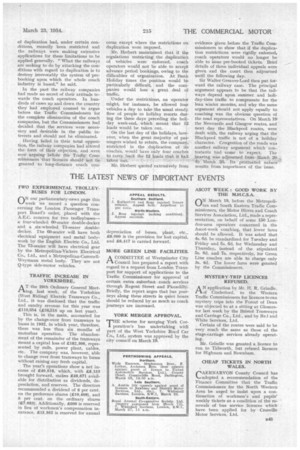MANY RAILWAY APPEALS FOR LIMITED COACH DUPLICATION
Page 62

Page 63

If you've noticed an error in this article please click here to report it so we can fix it.
Road Interests Submit That Duplication Restrictions . Would Eliminate Pre-booking A LLEGATION that the railway coral'apanies were endeavouring to eliminate long-distance coach traffic by pressing, wherever possible, for the limitation of duplication of coaches was made by Mr. E. S. Herbert during the hearing, at the Ministry of Transport, on March 15, of appeals in which 15 coach companies were concerned. The concerns, operating on routes from the North to London, appeared in 27 appeals, together with the London and North-Eastern and London, Midland and Scottish Railway Companies. In some cases the coach operators appealed against the conditions of duplication, but, in the majority, the railways sought for the restrictions to be applied.
Mr. Herbert explained that the power of duplication had, under certain conditions, recently been restricted and the railways were making extensive applications for these limitations to be applied generally. "What the railways are seeking to do by attacking the conditions with regard to duplication is to destroy irrevocably the system of prehooking upon which the whole coach industry is based," he said.
In the past the railway companies had made no secret of their attitude towards the coach operators. In hundreds of cases up and down the country they had employed counsel to argue before the Traffic Commissioners for the complete elimination of the coach companies, but the Commissioners had decided that the services were necessary and desirable in the public interests and should not be eliminated.
Having failed in their total opposition, the railway cdinpanies had altered thefOrM of their objection, and were now arguing before the Traffic. CoinmiSsioners that licences should hot bic. granted to long-distance coach con
cents except where the restrictions on duplication were imposed.
Mr. Herbert maintained that if the regulations restricting the duplication of vehicles were enforced, coach operators would not be able to accept advance period bookings, owing to the difficulties of organization. At Bank Holiday times the position would be particularly difficult, and the companies would lose a great deal of traffic.
Under the restrictions, an operator might, for instance, be allowed four vehicles a day to take the usual steady flow of people to holiday resorts during the three days preceding the holiday week-end, which meant that 12 loads would be taken out.
On the last day of the holidays, however, when the great majority of passengers wished to return, the company, restricted in the duplication of its coaches, would have only four coaches to earry-.,back the 12 loads that it had
taken out.
• Mr. Herbert quoted extensively from evidence given before the Traffic Commissioners to show that if the duplica tion restrictions were rigidly enforced, coach operators would no longer be able to issue pre-booked tickets. Brief details of three individual appeals were given and the court then adjourned until the following day.
Sir Walter Greaves-Lord then put forward the railway case. The principal argument appears to be that the rail ways depend upon summer and holiday-time traffic to compensate for the lean winter months, and why the same argument should not apply equally to coaching was the obvious question of the road representatives. On March 19 the Newcastle. and Glasgow routes, and next day the Blackpool routes, were dealt with, the railway urging that the Blackpool traffic is not of a holiday character. Congestion of the roads was
another railway argument which -con
testants had come to expect. The hearing was adjourned fromMarch 20 to March 26, Its protracted nature' results from importance of the issue.




































































































